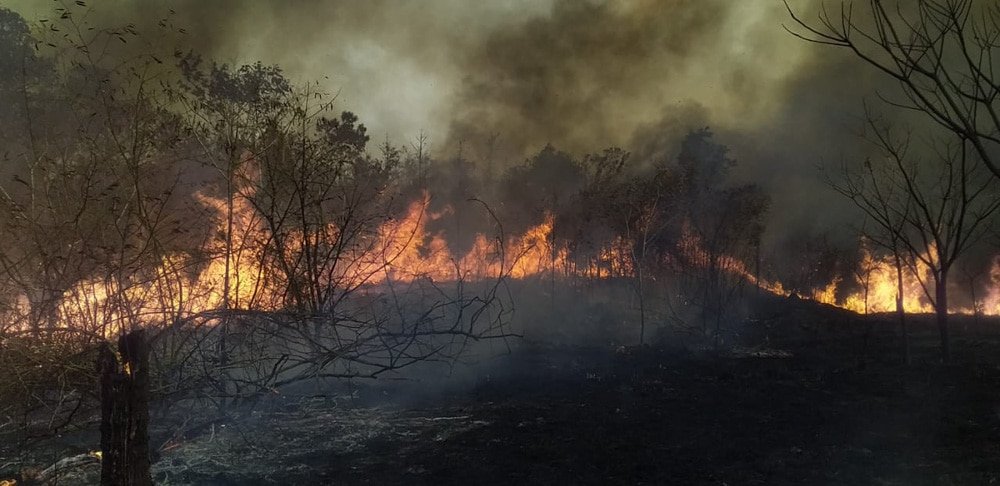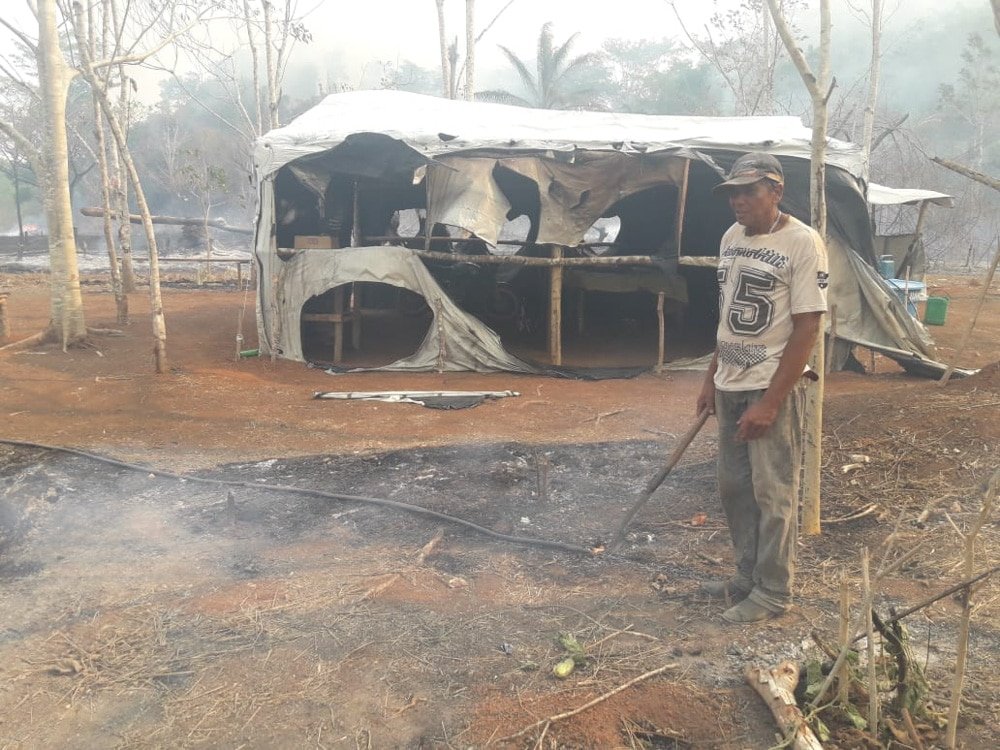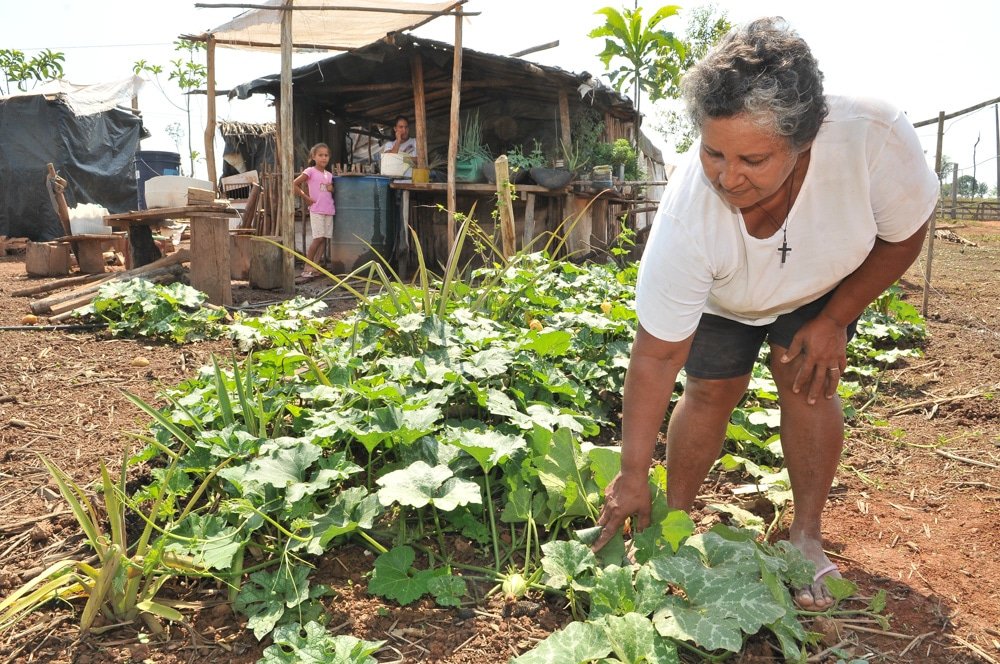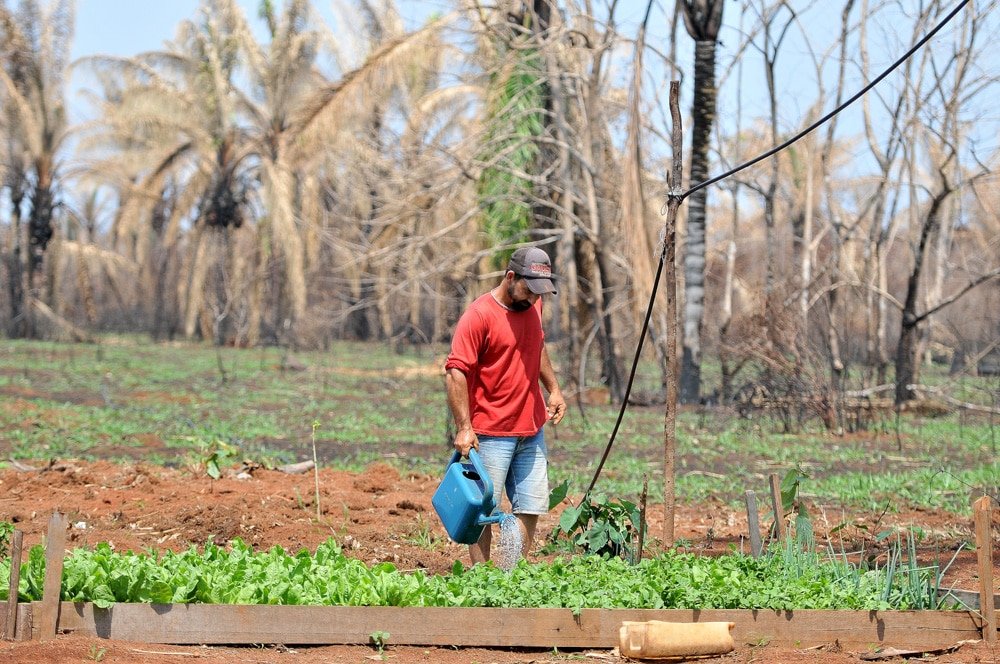Mato Grosso State
AMAZON REGION
Projeto de Desenvolvimento Sustentável [Sustainable Development Project] (PDS) Boa Esperança[1] is located in northern Mato Grosso state, in the municipality of Novo Mundo, within Amazonian territory. Since 2005, PDS Boa Esperança has been home to one hundred families claiming the right to land. They call for a segment of Araúna farm, located within the Gleba Nhandú tract, property of the federal government. Araúna farm is constituted by land totaling over 14,700 hectares that was grabbed by Marcello Bassan over 20 years ago. The area claimed by the families consists of approximately 6,300 hectares. Since 2015, fire has been used as a weapon against these families.
Their resistance process has been going on for many years. Part of the area was occupied by the families in 2013, who, after being evicted in 2015, returned to the land in March 2020, where they now remain. In the process, families have endured various acts of violence by the land grabber, his henchmen, and the police itself, in addition to discrimination by city residents, especially the children at school.
The dispute ended up in court. In 2009, the federal government filed a claim with the Federal Court of Sinop, Mato Grosso state, to have the area reinstated, based on a “social interest” finding issued by Incra [Brazil’s National Institute of Colonization and Agrarian Reform]. The request was granted in September 2019. However, for the government to take possession of the land, Incra must first conclude the administrative process that gave origin to the PDS Boa Esperança, which has not yet happened, notwithstanding the body’s favorable preliminary technical findings on the issue.[2] It was the families themselves who changed the encampment designation to PDS when they returned to the area in 2020.
All requests for land regularization made by the illegal occupant of the area and his estate were rejected by Incra. However, part of the area continues to be exploited by the land grabber for cattle farming and illegal forest logging.
Notes
Translator’s Note: In Brazil, a community seeking land redistribution is called “acampamento” (an encampment) until it receives a favorable decision by the country’s competent authorities. Following this decision, the community is officially recognized as “assentamento” (a settlement). Hence the use of the term “pre-settlement” in this case.
See: “Após despejos e ameaças, sem-terra têm decisão favorável da Justiça pela reforma agrária – e governo não cumpre” [“Following evictions and threats, landless people win court decision for agrarian reform – but government fails to comply”], Repórter Brasil. December 2020.
Fire as a weapon
Incra’s involvement is intensifying the existing conflicts in the countryside and, in particular, those in the Araúna farm area. The families have suffered well-reported violence. Since the day when the families were first ejected from the territory in 2009[3], fire has been recurrently used as a weapon. In addition to everyday threats, the families suffered particular escalation of violence in 2015, 2016, and 2020.
On October 1, 2015, following a court order for eviction, the land grabber’s henchman set fire to 80 wooden houses built by the families. On February 21, 2016, in a particularly violent incident, 12 heavily armed henchmen arrived in the territory at dawn, opening fire into the air, threatening to kill residents, and throwing gasoline onto the shacks while children were inside, threatening to set them on fire. The families left the pre-settlement with nothing but the clothes on their bodies, and what was left behind – all of their personal belongings, kitchen equipment and utensils, mattresses, food, crops – was burned, including two cars and a motorcycle. The community church was torn down.[4]
On September 12, 2020, there was yet another attempt by the land grabber to throw the families out of their homes, using fire again as a weapon. According to the families, the fire “came from the headquarters of Araúna farm towards the pre-settlement and burned almost everything”.

Several police reports were filed with the police department of the municipality of Guarantã do Norte, denoting that the fire originated from the headquarters of Araúna farm and that there were ongoing ‘rumors’ that the area’s illegal occupant, “would set the place on fire in order to burn all the residents of the settlement out.” The same concerns were expressed to the Human Rights Defense Council of Mato Grosso (Conselho de Defesa dos Direitos da Pessoa Humana de Mato Grosso, CDDPH), during an on-site visit on July 21 and 22, 2020.[5] Although there were no casualties, there was devastating destruction of forest land, houses, crops, and fences, not to mention the loss of small animals, including wild animals. Ninety percent of the area occupied by the families was burned. Based on information from the Secretary of State for Security [Secretaria de Estado de Segurança], the state police authority, the complaints remain under investigation.
Notes
“No Mato Grosso a esperança não é boa e o mundo não é novo” [“In Mato Grosso state, there is no hope and the world is not a kind place.”] February 2016.
See note by the Conselho de Defesa dos Direitos da Pessoa Humana de Mato Grosso [Human Rights Defense Council of Mato Grosso]-CDDPH and by the Fórum de Direitos Humanos e da Terra [Forum on Human and Land Rights]-FDHT/MT. “Fogo e grilagem em Mato Grosso, a violência continua destruindo o sonho das famílias do pré-assentamento Boa Esperança.” [“Fire and land grabbing in Mato Grosso, where violence continues to destroy the hopes of families in the Boa Esperança pre-settlement.”] August 2020.
“We plant in order to eat… surviving with what we have. When the fire broke out, we had pineapple, cassava plantations… Most of it was burned… including my house, and all the little things inside were burned as well.”
“I had to run with the boys to the river because of the smoke, as the boys’ room burned out.”
“The fire consumed my entire crop.”
Nevertheless, almost a year after the complaints were originally filed, no one was held responsible for those acts, and once again, on July 14, 2021, families reported that another fire was started in the vicinity of Araúna farm’s headquarters, for which new reports were filed. The families stopped the fire from crossing into the area occupied by the community by posting round-the-clock firefighting teams, and by creating firebreaks to protect the territory.
In addition to the ongoing acts of violence, for more than ten years the families and the Pastoral Land Commission [Comissão Pastoral da Terra] have been persistently reporting environmental crimes taking place in the vicinity of Araúna farm to several government authorities (MPF, federal police, SEMA, IBAMA, state Government). All cases are supported by extensive documentation, image and video files, and supplemented by maps that pinpoint the location of the crimes.[6]
Notwithstanding all the evidence, there is no perceived action by the competent bodies to investigate the complaints, be it in relation to the environmental crimes or the violence inflicted on the families. Thus, land grabber Marcello Bassan and his son, Marcello Bassan Junior, have not been held responsible for any of the crimes committed to date. Their impunity fuels the ongoing violence inflicted against the families.
Several actions by the land grabbers rely on the connivance and omission by the police authorities of the municipalities of Novo Mundo and Guarantã do Norte, as was the case on April 1, 2020. Soon after the families occupied part of the Araúna farm area, the police engaged them in a violent fashion, making use of the land grabber’s vehicle to reach their encampment and then refusing to file a police report when requested to do so by the families, an action which was later denounced by the Human and Land Rights Forum (Fórum de Direitos Humanos e da Terra, FDHT), and by the Pastoral Land Commission.
Resistance
After having spent years fighting and resisting in precarious encampment conditions, living under canvas shacks, occupying this territory has allowed the families to build their own homes and to lead dignified lives on their plots of land. They seek to subsist from the land by growing various types of crops, such as rice, beans, corn, cassava, fruits, and vegetables, in addition to raising animals to feed their families, such as free-range chickens, pigs, and cattle. The land is rich in water resources, boasting rivers and fish, as well as crystal-clear drinking water, which the families strive to preserve and protect.
Neither electricity nor telephone signal have reached the community yet. Hence, the families face several challenges involving everyday activities, particularly regarding communication, food conservation, and leisure. The community is home to one hundred families. and more than 45 children who are growing up amid trials and tribulations. Besides that, these people carry on the fight without losing hope, persevering in the territory, in search of dignified and peaceful lives in the backcountry.
Despite it all, the families have many plans for the future. The main one is to remain on the land, which they expect Incra to regularize in support of PDS Boa Esperança, because, in the words of one of the settlers: “no one is here who does not need to be, we all need these little plots of land to survive, to be able to provide a better future for our children”.
Notes
All the records are filed at the Centro de Documentação Dom Tomás Balduíno [Dom Tomás Balduíno Records Center], land disputes database, maintained by Comissão Pastoral da Terra [Pastoral Land Commission].
Elizabete Fatima Flores is a people’s lawyer and agent of the Comissão Pastoral da Terra [Pastoral Land Commission] in Mato Grosso
Luana Carina Bianchin holds a forest engineering degree from Universidade Federal de Mato Grosso [Federal University of Mato Grosso] and is an agent of the Comissão Pastoral da Terra [Pastoral Land Commission]








